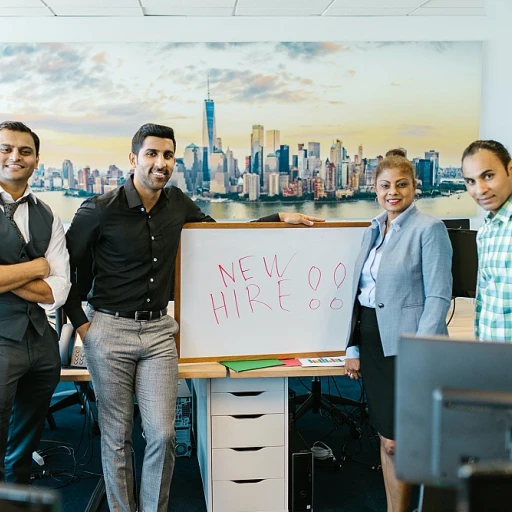Understanding the Digital Landscape
Embracing the Digital Transformation in Recruitment
With the meteoric rise of digital marketing, the dynamics of recruitment have drastically changed. Today's recruitment process requires a deep understanding of the digital landscape to effectively attract and engage top talent. Companies need to be active in the digital age to stay competitive and appealing.
For employers, this means leveraging the plethora of social media platforms to reach potential candidates at various touchpoints. Platforms such as LinkedIn, Twitter, and even Instagram are pivotal in building a robust employer brand that resonates with job seekers worldwide.
The contemporary digital landscape provides opportunities to understand the preferences and behaviors of your target audience better. This insight aids in crafting a candidate experience that is not only engaging but also aligned with the core values and objectives of your company.
One way to enhance this digital strategy is by integrating career maturity inventory assessments. This approach provides a holistic view of candidates, facilitating a match that benefits both the company and the individual. Understanding candidates' aspirations and career goals helps tailor your approach, making your recruitment marketing efforts more effective.
To successfully navigate and master the digital landscape, companies need to blend innovative marketing strategies, technology-driven tools, and a profound understanding of branding. This ensures that recruitment strategies not only attract top talent but also foster a thriving work-life balance culture within the organization.
Crafting an Attractive Employer Brand
Building a Compelling Employee Value Proposition
In today's digital age, crafting an employer brand that resonates with potential candidates involves more than just spotlighting what makes a company successful. An effective employer brand captures the essence of a company's culture, values, and the overall employment experience it provides. This helps to attract top talent who not only possess the right skills but are also aligned with the company's ethos. An essential part of employer branding involves creating meaningful content that communicates the company culture and work-life balance offered to employees. Highlighting the benefits, professional growth opportunities, and supportive work environments can position your organization as an employer of choice. This form of content marketing serves as a powerful tool to properly market your organization to prospective talent. Organizations should ensure that their marketing strategies align with the preferences of their target audience. Engaging top talent often requires emphasizing how your company invests in its workforce and fosters a positive workplace culture. Utilizing authentic visuals and employee testimonials in digital marketing can further empower your employer branding efforts by providing job seekers a genuine glimpse into your company. For companies that wish to leave a lasting impression on potential candidates, it's important to adopt recruitment marketing strategies that leverage multiple platforms, including social media and job postings. By presenting a coherent and attractive employee value proposition, your recruitment process will be more effective in capturing the attention of high-caliber candidates. To explore how Mars Hill University approaches employer branding and their recruitment strategy, you may find valuable insights in this exploring career opportunities at Mars Hill University article.Utilizing Social Media for Recruitment
Amplifying Recruitment Efforts through Strategic Use of Social Media
In today's digitally-driven world, social media has become a pivotal tool in recruitment marketing efforts. It's essential for companies to harness the power of these platforms to effectively reach and engage potential candidates. By doing so, businesses can attract top talent that aligns with their company culture and values. Social media offers a platform for employers to showcase their unique employer brand and culture. This is crucial in setting a company apart in the competitive talent market. Engaging content that highlights the workplace environment, employee testimonials, and success stories can enhance the company’s image and appeal to job seekers. This form of digital marketing not only enhances the brand's visibility but also builds a connection with the audience. Moreover, social platforms are an excellent means for direct interaction with potential candidates. Engaging in conversations and responding to inquiries can enhance the candidate experience, providing them with insights into the company's values and work ethic. Utilizing social media for recruitment also allows for targeted advertising, where companies can focus on specific demographics and job roles, maximizing the effectiveness of their recruitment strategies. To sum up, incorporating social media into a comprehensive recruitment marketing strategy offers numerous advantages. It provides an opportunity to reach a broader audience, foster engagement, and enhance employer branding efforts. As companies navigate the recruitment process, leveraging these digital platforms can play a crucial role in attracting top talent, ultimately contributing to a successful talent acquisition strategy. For more insights on finding balance in your recruiting strategies, explore this guide to achieving harmony.Balancing Work and Life in Recruitment Strategies
Ensuring Harmony Between Recruitment Duties and Personal Life
Recruiting talent in today's fast-paced digital age demands not only marketing prowess but also ensuring balance between work responsibilities and personal life. With the overwhelming influx of digital media platforms, maintaining a healthy work-life equilibrium has taken center stage in the recruitment process for companies, candidates, and hiring professionals alike. Effective recruitment marketing should consider the demands placed on recruiters and candidates. Here’s how you can integrate balanced strategies into your recruitment marketing efforts:- Flexible Work Arrangements: Adapt your recruitment strategy to include flexible work options such as remote work roles and flexible hours. This aligns with candidate preferences while allowing recruiters to manage their workloads in a way that respects personal commitments.
- Promote Company Culture: Highlight your company culture, which supports work-life balance in your employer branding. This attracts top talent looking for workplaces that value their personal time as much as professional accomplishments.
- Utilize Digital Tools Wisely: Leverage digital tools to streamline processes and reduce the burden on recruitment teams. For example, using AI to pre-screen candidates helps minimize workload and improve the candidate experience.
- Content Marketing: Share content on social media platforms that underscores your commitment to work-life balance. Share stories and testimonials about how employees successfully manage their careers and personal lives.












